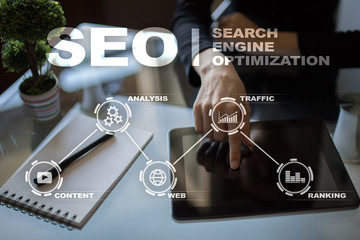Backlinking is a term that gets thrown around a lot in the SEO world, but it’s often misunderstood. A backlink is a link from one page to another, and it has a huge impact on your search engine ranking.
The relevance of a referring domain to your site is one of the largest factors that Google looks at. For example, a backlink from a digital marketing website is more valuable than a link from an outdoor gear store. Contact Condori Digital for professional help.
A solid link building strategy can help you gain a competitive edge on search engine results pages (SERPs). It can also increase brand awareness and encourage visitors to spend more time on your site, which can lead to more conversions. However, it is important to focus on high-quality links and abstain from using unethical methods. In addition, it is essential to ensure that your website and the sites you link to are mobile-friendly.
Before starting a link building campaign, you should research your audience and understand what kind of content they are looking for. This will allow you to create relevant, useful content for your target audience. It will also be easier to reach out to potential link partners because you will know which types of websites they visit.
You should also use tools like Ahrefs or Majestic to find broken links on other websites and replace them with your own links. This will boost your rankings because Google takes into account the number and quality of backlinks when determining a page’s position on SERPs. Moreover, it will save you time and effort because you can find broken links quickly without manually checking every single webpage.
Link building is a time-consuming process, and it’s essential to be patient and persistent. SEO is a marathon, not a sprint, and it can take months before you see tangible results. It is also a highly fluid field, and changes in Google algorithms and user behavior can alter the effectiveness of your tactics. Therefore, you should make sure to regularly analyze your progress and fine-tune your strategy as necessary.
In addition to link building, a comprehensive seo strategy should include keyword research, on-page optimization, and social media engagement. This will give you a better chance of ranking higher in SERPs, which can bring more traffic to your site. In addition, it will help you establish your brand as an authority in the industry and build trust among users. Additionally, it will provide you with more opportunities to rank for competitive keywords. These techniques can be effective for both new and existing websites.
Keyword research
Keyword research is one of the foundational elements of a successful SEO strategy, and it can be used as a compass to guide your content creation. The goal of a keyword research process is to find valuable terms that search engines recognize as relevant to your audience. It also allows you to identify competitors and understand how they’re using keywords.
Keywords are specific words or phrases that users type into search engine results pages (SERPs). They can be either text-based or voice search queries. Choosing the right keywords for your website will improve its visibility and help you drive more organic traffic. It is important to choose keywords that are both relevant to your product and services and also have high search volume.
The most common way to determine a good keyword is by examining its average monthly search volume. This is a relatively straightforward concept, and most tools that measure the search volume of specific keywords will display this number for each query entered. However, there are other factors to consider when selecting a keyword. For example, you should avoid keywords with too much competition. If you select a popular keyword with too many results, it will be difficult to rank highly.
Lastly, it’s important to understand the search intent behind each keyword. For example, a keyword like “used golf clubs” might indicate commercial or transactional intent, while a phrase such as “types of golf clubs” indicates informational intent. Understanding these differences can help you create more targeted content.
A solid keyword research strategy can be a great investment in the long term, and it can have a significant impact on your overall SEO performance. By using the right tools and strategies, you can create quality content that will improve your website’s visibility. However, it’s essential to know that SEO is a continuous process, and it should be incorporated into every piece of content on your website.
As a unit, you should begin your SEO effort by defining its goals and identifying the audience that you want to reach. This will provide a framework for your content, and it will ensure that the audience you’re targeting receives the information they need. Once you have identified the desired audience, you can start to conduct your keyword research.
On-page optimization
On-page optimization is a major part of SEO, and it involves optimizing the content on your website pages. This includes everything from meta descriptions to title tags. It also includes keyword research and placement, and ensuring that your web pages are optimized for user intent. This is a crucial part of search engine optimization, and it will help you improve your rankings over time.
Backlinks are another aspect of seo, and they are a great way to get more traffic. Backlinks are links that point from one website to yours, and they help Google identify your content as a reliable source. By having quality backlinks, you can increase your chances of getting to the top of the search results page.
To do this, you need to have quality content that is relevant and useful for users. This will ensure that your website is seen by more people, and it will encourage visitors to share your content. It is important to remember that on-page optimization is a continuous process, and you need to keep up with new trends and techniques.
While SEO is a complex topic, there are some basic concepts that can help you make the most of your efforts. First, understand the difference between on-page and off-page SEO. On-page SEO refers to all of the measures you take within your control to boost your website’s ranking on search engines. This typically includes optimizing the content of your website pages, as well as the HTML code that runs them. Off-page SEO, on the other hand, refers to all of the strategies you use outside your website to generate traffic.
On-page SEO can be a complex process, but it is essential for increasing the visibility of your website. Some of the key aspects of on-page optimization include keyword research, title and tag optimization, and image optimization. Keyword research is essential for identifying the best keywords for your content, and placing them strategically in your web copy. It is also important to use keywords naturally to avoid keyword stuffing, which can harm your rankings. It is also a good idea to use a variety of different keywords, as this will ensure that you attract a wide range of potential customers.
Social media
Social media is a powerful tool for increasing brand awareness, driving traffic and improving search engine rankings. Its power can be harnessed through a well-executed backlink strategy that involves both high-quality content and strategic placement of external links. The first step is to find a reliable backlink checker that can monitor your entire link profile and alert you when links are lost. Once you’ve found a good one, make sure to use it regularly so that you can keep track of your progress.
The social media aspect of backlinking involves promoting your content to influencers in your industry. This can be done through paid advertisements on social media sites like Facebook, Instagram and Twitter. These ads can be targeted to reach a specific demographic or location, and can have a significant impact on your campaign’s ROI. It is also important to consider the value of each share, retweet and comment on your social media posts. While these don’t directly affect SEO, they are a strong signal to search engines that your content is valuable and should be ranked highly.
A strong social media strategy can also help you build backlinks through collaborations with similar brands. This may include writing guest articles on a competitor’s website or participating in forums. This way, you can establish yourself as an authority in your industry and gain a valuable backlink. Moreover, you can make it easier for potential customers to find your website by including a link to it in your social media bios and product descriptions.
Another way to generate backlinks is by using a tool that tracks mentions of your domain name in other websites. This can be an effective strategy for identifying opportunities to get your content linked by other bloggers and journalists. For example, if your company wins an award or is mentioned in a press release, you can ask the publisher for a link to your website. However, it is recommended to avoid spamming or overusing this strategy, as it may harm your reputation. Also, it is best to work with an agency that specializes in backlinking, rather than trying to do it yourself.


